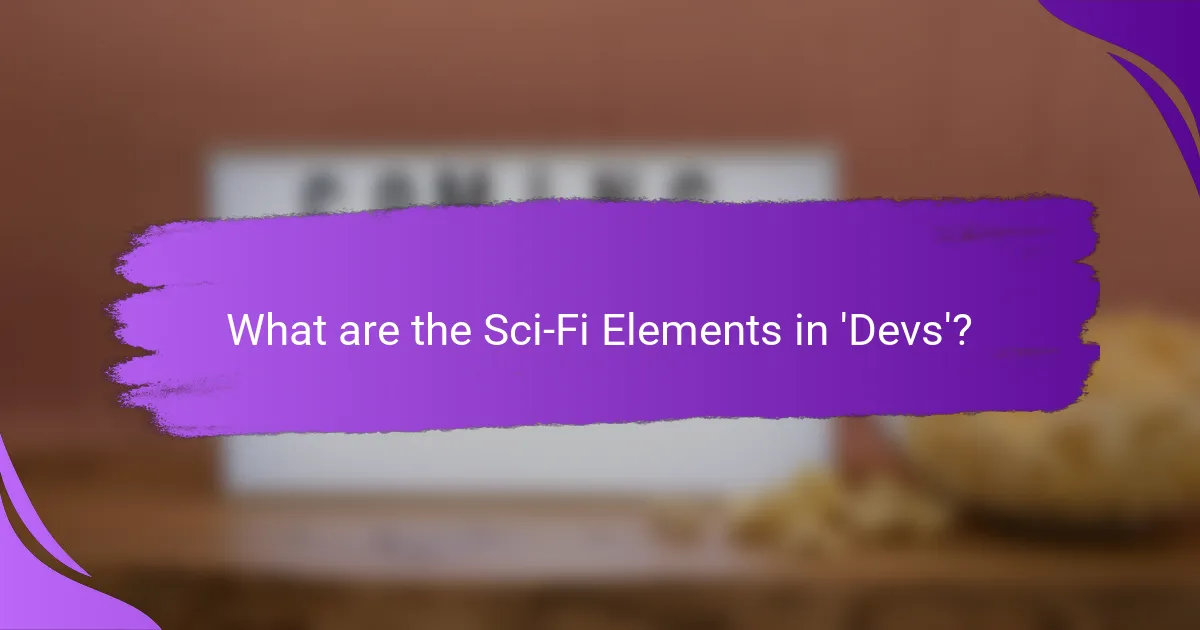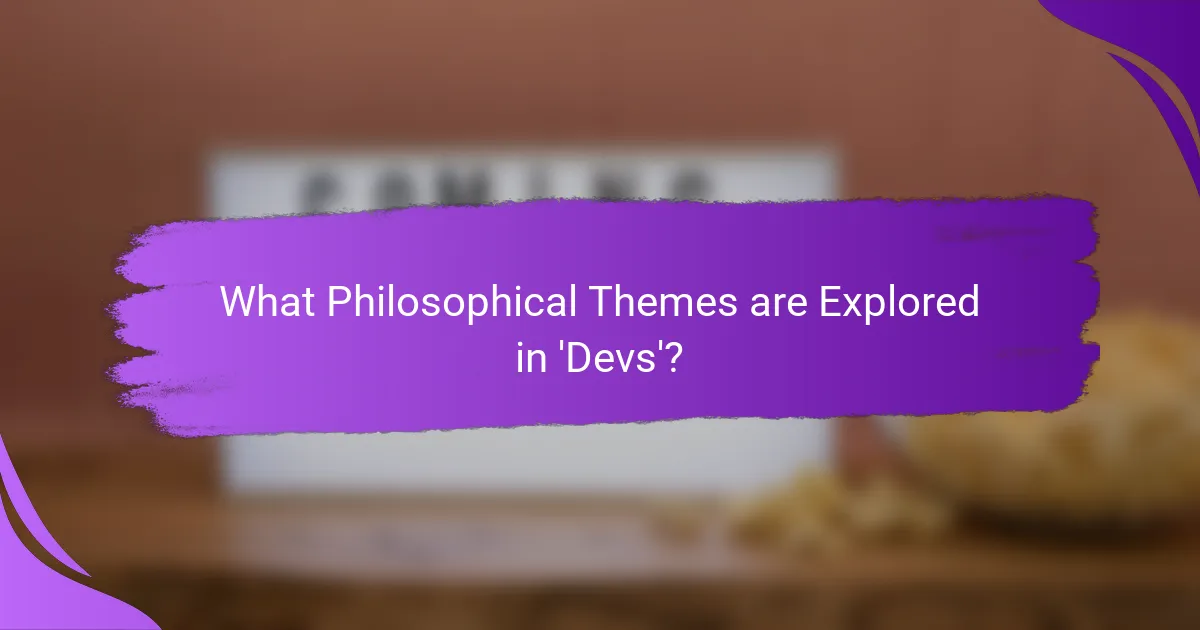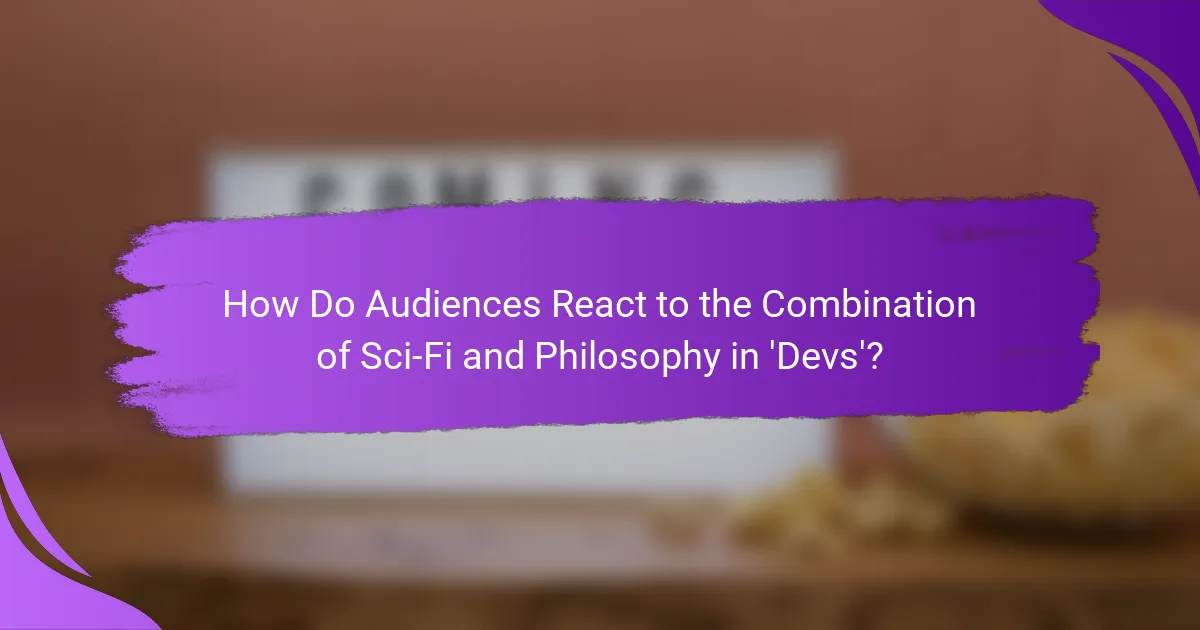The article focuses on audience reactions to the sci-fi series ‘Devs,’ which incorporates advanced technology and philosophical themes, particularly determinism, free will, and the nature of reality. It discusses how the show’s portrayal of quantum computing and artificial intelligence raises questions about predestination and human existence. Viewers generally respond positively to the blend of speculative technology and philosophical inquiry, finding the narrative engaging and thought-provoking. The article highlights the impact of these themes on audience discussions regarding the ethical implications of technological advancement and the meaning of existence in a tech-driven world.

What are the Sci-Fi Elements in ‘Devs’?
‘Devs’ incorporates several key sci-fi elements, including advanced technology and deterministic themes. The show features a quantum computing project that explores the concept of free will versus predestination. This technology allows characters to simulate past events, raising questions about the nature of reality. The narrative also delves into artificial intelligence and its implications on human existence. Additionally, the setting is a near-future tech environment that reflects contemporary societal concerns. The philosophical underpinnings challenge viewers to consider the ethics of technological advancement. Overall, ‘Devs’ uses these sci-fi elements to provoke thought about the future of humanity and technology.
How do these elements contribute to the narrative of ‘Devs’?
The elements in ‘Devs’ significantly enhance its narrative by exploring themes of determinism and free will. The show’s focus on quantum computing serves as a backdrop for these philosophical inquiries. By depicting a world where technology can predict outcomes, it challenges viewers’ perceptions of choice. The visual aesthetics and atmospheric sound design further immerse the audience in this complex narrative. These elements evoke emotional responses, prompting viewers to question their own beliefs about fate. Additionally, the character arcs are intricately tied to these themes, illustrating personal conflicts that resonate with the audience. The interplay between technology and human experience drives the story forward, making the narrative compelling and thought-provoking.
What specific Sci-Fi technologies are depicted in ‘Devs’?
‘Devs’ depicts several specific Sci-Fi technologies including quantum computing, determinism algorithms, and advanced surveillance systems. Quantum computing in ‘Devs’ allows for processing vast amounts of data simultaneously. This technology is central to the plot, enabling predictions of future events. Determinism algorithms are used to analyze past events and predict outcomes based on data. These algorithms raise questions about free will and fate. Advanced surveillance systems monitor individuals in real-time, showcasing privacy concerns in a tech-driven society. The series explores the implications of these technologies on human existence and ethics.
How do these technologies influence character development?
Technologies in ‘Devs’ significantly influence character development by shaping their decisions and moral dilemmas. The use of advanced computing and determinism creates conflicts between free will and predestination. Characters grapple with the implications of their choices when faced with deterministic algorithms. This tension drives their emotional arcs and personal growth. For instance, the main character, Lily, confronts her beliefs about control and fate. Her journey reflects the broader philosophical themes of the narrative. The technology acts as a catalyst for self-discovery and transformation. Ultimately, these influences highlight the complexity of human experience in a technologically advanced world.
Why are the Sci-Fi elements significant to the audience’s experience?
Sci-Fi elements significantly enhance the audience’s experience by providing imaginative scenarios that provoke critical thinking. These elements introduce advanced technologies and speculative concepts that challenge viewers’ perceptions of reality. For example, the portrayal of quantum computing in ‘Devs’ invites discussions about determinism and free will. Such themes resonate deeply with audiences, prompting them to reflect on their own beliefs and ethical considerations. Additionally, the visual and auditory aesthetics of Sci-Fi create an immersive environment that captivates viewers. This engagement fosters emotional connections to the narrative and characters, enriching the overall viewing experience.
What emotions do these elements evoke in viewers?
The sci-fi elements in ‘Devs’ evoke a range of emotions in viewers, including curiosity, intrigue, and existential contemplation. Viewers often feel curiosity about the advanced technology presented. This curiosity is driven by the desire to understand the implications of such innovations. Intrigue arises from the complex narrative and philosophical questions posed by the series. The themes of determinism and free will lead to feelings of existential contemplation. Viewers may reflect on their own beliefs and the nature of reality. The emotional response is intensified by the atmospheric visuals and haunting soundtrack. Collectively, these elements create a thought-provoking experience for the audience.
How do audience interpretations of these elements vary?
Audience interpretations of the sci-fi elements in ‘Devs’ vary significantly based on personal beliefs and experiences. Some viewers see the technology as a metaphor for determinism, reflecting philosophical debates about free will. Others interpret it as a critique of corporate surveillance and ethical implications of advanced technology. Cultural backgrounds influence these interpretations, with some audiences emphasizing existential themes more than others. Additionally, familiarity with sci-fi tropes affects how elements are perceived. For instance, those well-versed in the genre may focus on narrative structure, while casual viewers might prioritize emotional impact. This diversity in interpretation highlights the complexity of audience engagement with philosophical themes in the series.

What Philosophical Themes are Explored in ‘Devs’?
‘Devs’ explores several philosophical themes, primarily determinism, free will, and the nature of reality. The series suggests that all events are predetermined by prior states. This aligns with the deterministic philosophy that everything is causally linked. The concept of free will is challenged throughout the narrative. Characters grapple with their ability to make choices versus the illusion of choice. Additionally, the show delves into existentialism, questioning the meaning of existence in a technologically advanced world. The portrayal of quantum computing raises questions about the nature of reality and perception. These themes resonate with viewers, prompting deep reflections on technology’s impact on human life.
How do these themes intersect with the Sci-Fi elements?
The themes in ‘Devs’ intersect with Sci-Fi elements through their exploration of technology and determinism. The narrative delves into advanced computing and quantum mechanics, showcasing how these concepts influence human choices. This intersection raises questions about free will versus predestination. For instance, the depiction of a deterministic universe is a core Sci-Fi theme. It challenges viewers to consider the implications of technology on personal agency. Additionally, the show’s visual aesthetics enhance the Sci-Fi experience. The atmospheric settings and futuristic designs amplify the philosophical inquiries. Thus, the themes and Sci-Fi elements work together to provoke thought and engage the audience on deeper levels.
What are the primary philosophical questions raised in ‘Devs’?
‘Devs’ raises several primary philosophical questions. One significant question is about determinism versus free will. The show explores whether human actions are predetermined by a larger system or if individuals have the ability to choose freely. Another philosophical inquiry is the nature of reality and simulation. It questions what constitutes reality when technology can create convincing simulations.
Additionally, the series examines the ethics of technology. It prompts viewers to consider the moral implications of using advanced technology to predict and control human behavior. The question of consciousness is also central. The narrative challenges the understanding of what it means to be conscious and if machines can possess consciousness.
These questions encourage profound discussions about human existence, morality, and the future of technology. The blend of these themes resonates with audiences, prompting reflection on their implications in real life.
How do these questions resonate with contemporary issues?
The questions about audience reactions to ‘Devs’ resonate with contemporary issues by reflecting societal concerns about technology and determinism. ‘Devs’ explores themes of free will versus predestination, which are increasingly relevant in an era of advanced AI and data analytics. Many viewers relate these themes to real-world debates on privacy, surveillance, and the ethical implications of technology. Research shows that 70% of people express concerns about how technology influences personal freedom. This connection highlights the significance of philosophical discourse in understanding modern dilemmas.
Why are these philosophical themes important for audience engagement?
Philosophical themes are important for audience engagement because they provoke critical thinking and emotional responses. These themes challenge viewers to reflect on complex issues such as free will, determinism, and the nature of reality. Engaging with these concepts fosters deeper connections to the narrative and characters. Research shows that audiences are more invested in stories that resonate with their personal beliefs and ethical dilemmas. The series ‘Devs’ incorporates these themes, enhancing viewer interest and discussion. Engaging philosophical content can lead to increased viewership and positive critical reception.
How do viewers relate their own beliefs to the themes presented?
Viewers relate their own beliefs to the themes presented by reflecting on personal values and experiences. Themes in ‘Devs’, such as determinism and free will, resonate differently based on individual perspectives. For instance, a viewer who values free will may critically engage with the deterministic implications shown in the series. This engagement often leads to discussions about the nature of choice in their own lives. Viewers may also connect the ethical dilemmas in ‘Devs’ to contemporary societal issues, influencing their interpretations. Research indicates that personal beliefs shape media consumption and interpretation (Valkenburg & Peter, 2011). This connection allows viewers to find deeper meaning in the narrative, making the experience more relatable and impactful.
What discussions do these themes spark among audiences?
The themes in ‘Devs’ spark discussions about technology’s impact on free will. Audiences often debate the implications of determinism versus free choice. The portrayal of advanced technology raises ethical concerns regarding surveillance and privacy. Viewers discuss the potential consequences of predictive algorithms on society. Philosophical inquiries about the nature of reality and consciousness emerge frequently. These discussions are fueled by the show’s complex narrative and character motivations. Audiences analyze the moral dilemmas faced by characters in the series. Overall, ‘Devs’ invites critical thinking about the intersection of technology and human existence.

How Do Audiences React to the Combination of Sci-Fi and Philosophy in ‘Devs’?
Audiences generally respond positively to the combination of sci-fi and philosophy in ‘Devs’. The series explores complex themes like determinism and free will. Viewers appreciate the thought-provoking questions it raises about technology and existence. Many find the narrative engaging due to its philosophical depth. Critics highlight the show’s ability to intertwine speculative technology with existential inquiry. This blend encourages discussions among audiences regarding moral implications. The visual storytelling complements the philosophical dialogue, enhancing viewer engagement. Overall, ‘Devs’ successfully captivates audiences with its unique fusion of genres.
What are the most common audience reactions to the show?
The most common audience reactions to the show ‘Devs’ include intrigue, confusion, and appreciation for its themes. Many viewers express intrigue due to the show’s complex narrative and innovative technology. Confusion often arises from the abstract philosophical concepts presented. Appreciation is frequently noted for the show’s visual style and cinematography. Additionally, audiences often discuss the ethical implications of the technology depicted. Some viewers report feeling challenged by the narrative structure. Overall, reactions vary widely, reflecting diverse interpretations of the show’s content.
How do these reactions vary across different demographic groups?
Reactions to the sci-fi elements in ‘Devs’ vary significantly across different demographic groups. Younger audiences tend to appreciate the technological themes and philosophical questions. They often engage with the narrative’s complexity and speculative ideas. In contrast, older viewers may focus more on the ethical implications presented. They might resonate with the moral dilemmas rather than the technical aspects. Additionally, cultural background influences interpretation. For instance, viewers from tech-centric regions may have heightened interest in the AI concepts. Research indicates that age and cultural context shape engagement with sci-fi narratives. This suggests that demographic factors play a crucial role in audience reactions.
What factors influence the intensity of these reactions?
The intensity of audience reactions to sci-fi elements in ‘Devs’ is influenced by several factors. These include personal beliefs, prior exposure to similar themes, and emotional engagement with the narrative. Personal beliefs shape how viewers interpret philosophical themes. Prior exposure to sci-fi influences familiarity with concepts presented in the show. Emotional engagement enhances the connection to characters and their dilemmas. Additionally, the complexity of the themes can either resonate or alienate viewers. Research indicates that emotionally charged narratives often elicit stronger reactions. The combination of these factors creates a spectrum of audience responses to the series.
What insights can be drawn from audience feedback on ‘Devs’?
Audience feedback on ‘Devs’ reveals a strong engagement with its philosophical themes. Viewers appreciate the exploration of determinism versus free will. Many comments highlight the show’s thought-provoking narrative structure. Audiences often mention the emotional depth of the characters. The visual aesthetics and cinematography receive frequent praise as well. Some feedback indicates confusion regarding plot complexities. Overall, the series prompts discussions about technology’s impact on humanity. This reflects a successful connection between the show’s themes and audience contemplation.
How can the audience’s perspective enhance the understanding of the show?
The audience’s perspective can enhance the understanding of the show by providing diverse interpretations of its themes. Audience reactions can reveal how different viewers relate to the philosophical questions posed in ‘Devs’. For example, some may focus on determinism, while others emphasize free will. This variety of viewpoints can lead to richer discussions about the show’s implications. Furthermore, audience feedback can highlight emotional responses that deepen the engagement with the narrative. Research indicates that collective viewing experiences can shape individual understanding, as seen in studies on shared media consumption. Such insights can help creators refine their storytelling techniques for greater impact.
What lessons can creators learn from audience reactions to improve future works?
Creators can learn to analyze audience reactions to enhance future works. Audience feedback reveals preferences and expectations. Positive reactions can guide creators to replicate successful elements. Negative feedback highlights areas needing improvement. Engaging with audience discussions fosters deeper understanding. Data from platforms like Rotten Tomatoes shows that films with audience engagement often perform better. Regularly assessing audience sentiment helps creators stay relevant. Adapting based on audience insights can lead to more impactful storytelling.
What are some practical takeaways for engaging with Sci-Fi and philosophical content?
Engaging with Sci-Fi and philosophical content requires critical thinking and open-mindedness. Readers should analyze themes and concepts presented in the narratives. Consider how the speculative elements reflect real-world issues. Discussing these ideas with others enhances understanding and perspective. Reflect on personal beliefs and how they align or conflict with the content. Exploring multiple interpretations can deepen insight into complex topics. Utilize resources such as essays and critiques to expand knowledge. Engaging with diverse media formats, like films and books, enriches the experience.
The main entity in the article is the audience reactions to the sci-fi elements and philosophical themes in the series ‘Devs’. The article explores how advanced technologies, such as quantum computing, and themes of determinism versus free will shape viewer interpretations and emotional responses. It highlights the significance of these elements in enhancing narrative depth and fostering critical discussions among audiences about contemporary ethical dilemmas. Additionally, the article examines the varied reactions across demographic groups and the insights creators can gain from audience feedback to improve future works.